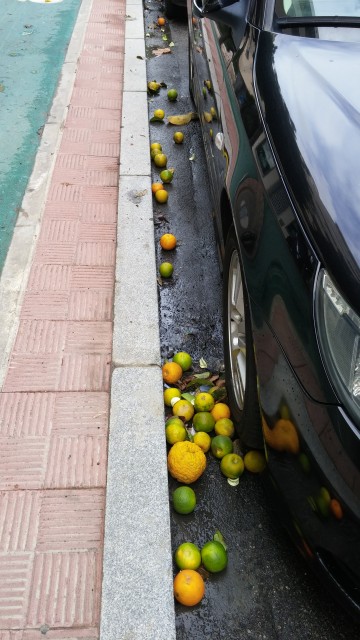
Charlie and Wynette: You have probably heard of Seville oranges, notoriously sour. They are the essential ingredient in the marmalade that is popular in England. (In 1995, when Wynette traveled to England, her friend Deborah asked her to bring back, in addition to PG Tips tea and McVitie’s wheat meal biscuits, “thick cut marmalade made from Seville oranges, has to be Seville oranges.”) Curiously it is very hard to find Seville orange marmalade in Seville. We finally found some, yesterday, in the fancy department store (El Corte Inglés) supermarket, but the marmalade was imported. (We noticed McVitie’s were available in El Corte Inglés as well. We’re sure they also had PG Tips.)
In the Rick Steves guide book for Spain, he says: “Orange trees abound — because they never lose their leaves, they provide constant shade. But forget about eating the oranges. They are bitter and used only to make vitamins, perfume, cat food and that marmalade you can’t avoid in British B&Bs.”
There certainly are orange trees everywhere plus the fruit on the ground. We brought two oranges back today and tasted them. Yep, very sour. Almost like a lemon. Twice now we’ve seen young children (both boys and girls) kicking the oranges like they are a soccer ball. These kids are pretty good at soccer.

Are Seville oranges sour or bitter? The rind is an essential ingredient in marmalade, and I think they are used because they are bitter. By the way, Valencia oranges, which I think are nominally a summer orange, unlike a naval (winter orange) are great for juicing.
Hi Henry, after you posted this comment, we got another orange and tasted again and all three of us (Pat, Charlie, me) voted that it was sour (vs. bitter). But we have heard of “bitter orange marmalade”. So, maybe the oranges they use are different? In the fruit market near our apartment we bought some “naranja zumo” which means juice oranges. We made juice from them and it was delicious and very sweet. Wynette